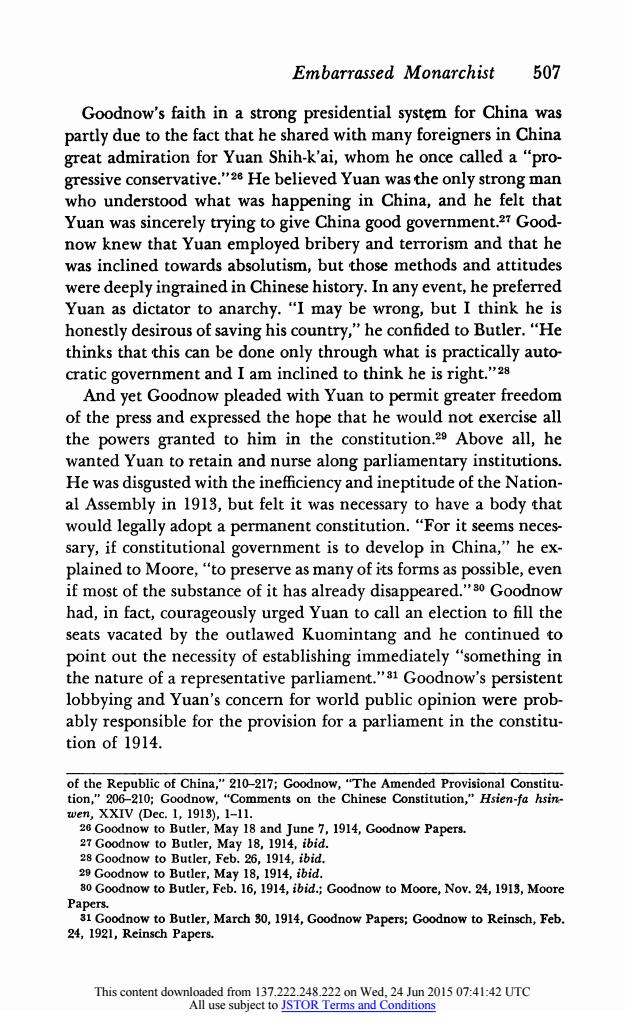正在加载图片...

Embarrassed Monarchist 507 Goodnow's faith in a strong presidential system for China was partly due to the fact that he shared with many foreigners in China great admiration for Yuan Shih-k'ai,whom he once called a "pro- gressive conservative."2 He believed Yuan was the only strong man who understood what was happening in China,and he felt that Yuan was sincerely trying to give China good government.27 Good- now knew that Yuan employed bribery and terrorism and that he was inclined towards absolutism,but those methods and attitudes were deeply ingrained in Chinese history.In any event,he preferred Yuan as dictator to anarchy."I may be wrong,but I think he is honestly desirous of saving his country,"he confided to Butler."He thinks that this can be done only through what is practically auto- cratic government and I am inclined to think he is right."2 And yet Goodnow pleaded with Yuan to permit greater freedom of the press and expressed the hope that he would not exercise all the powers granted to him in the constitution.29 Above all,he wanted Yuan to retain and nurse along parliamentary institutions. He was disgusted with the inefficiency and ineptitude of the Nation- al Assembly in 1913,but felt it was necessary to have a body that would legally adopt a permanent constitution."For it seems neces- sary,if constitutional government is to develop in China,"he ex- plained to Moore,"to preserve as many of its forms as possible,even if most of the substance of it has already disappeared."Goodnow had,in fact,courageously urged Yuan to call an election to fill the seats vacated by the outlawed Kuomintang and he continued to point out the necessity of establishing immediately "something in the nature of a representative parliament."31 Goodnow's persistent lobbying and Yuan's concern for world public opinion were prob- ably responsible for the provision for a parliament in the constitu- tion of 1914. of the Republic of China,"210-217;Goodnow,"The Amended Provisional Constitu- tion,"206-210;Goodnow,"Comments on the Chinese Constitution,"Hsien-fa hsin- wen,XXIV(Dec.1,1913),1-11. 26 Goodnow to Butler,May 18 and June 7,1914,Goodnow Papers. 27 Goodnow to Butler,May 18,1914,ibid. 28 Goodnow to Butler,Feb.26,1914,ibid. 29 Goodnow to Butler,May 18,1914,ibid. 80 Goodnow to Butler,Feb.16,1914,ibid.;Goodnow to Moore,Nov.24,1913,Moore Papers. 31 Goodnow to Butler,March 30,1914,Goodnow Papers;Goodnow to Reinsch,Feb. 24,1921,Reinsch Papers. This content downloaded from 137.222.248.222 on Wed,24 Jun 2015 07:41:42 UTC All use subject to JSTOR Terms and ConditionsEmbarrassed Monarchist 507 Goodnow's faith in a strong presidential system for China was partly due to the fact that he shared with many foreigners in China great admiration for Yuan Shih-k'ai, whom he once called a "progressive conservative."26 He believed Yuan was the only strong man who understood what was happening in China, and he felt that Yuan was sincerely trying to give China good government.27 Goodnow knew that Yuan employed bribery and terrorism and that he was inclined towards absolutism, but those methods and attitudes were deeply ingrained in Chinese history. In any event, he preferred Yuan as dictator to anarchy. "I may be wrong, but I think he is honestly desirous of saving his country," he confided to Butler. "He thinks that ,this can be done only through what is practically autocratic government and I am inclined to think he is right."28 And yet Goodnow pleaded with Yuan to permit greater freedom of the press and expressed the hope that he would not exercise all the powers granted to him in the constitution.29 Above all, he wanted Yuan to retain and nurse along parliamentary institutions. He was disgusted with the inefficiency and ineptitude of the National Assembly in 1913, but felt it was necessary to have a body that would legally adopt a permanent constitution. "For it seems necessary, if constitutional government is to develop in China," he explained to Moore, "to preserve as many of its forms as possible, even if most of the substance of it has already disappeared." 30 Goodnow had, in fact, courageously urged Yuan to call an election to fill the seats vacated by the outlawed Kuomintang and he continued to point out the necessity of establishing immediately "something in the nature of a representative parliament."31 Goodnow's persistent lobbying and Yuan's concern for world public opinion were probably responsible for the provision for a parliament in the constitution of 1914. of the Republic of China," 210-217; Goodnow, "The Amended Provisional Constitution," 206-210; Goodnow, "Comments on the Chinese Constitution," Hsien-fa hsiniwen, XXIV (Dec. 1, 1913), 1-11. 26 Goodnow to Butler, May 18 and June 7, 1914, Goodnow Papers. 27 Goodnow to Butler, May 18, 1914, ibid. 28 Goodnow to Butler, Feb. 26, 1914, ibid. 29 Goodnow to Butler, May 18, 1914, ibid. 80 Goodnow to Butler, Feb. 16, 1914, ibid.; Goodnow to Moore, Nov. 24, 1913, Moore Papers. 31 Goodnow to Butler, March 30, 1914, Goodnow Papers; Goodnow to Reinsch, Feb. 24, 1921, Reinsch Papers. This content downloaded from 137.222.248.222 on Wed, 24 Jun 2015 07:41:42 UTC All use subject to JSTOR Terms and Conditions